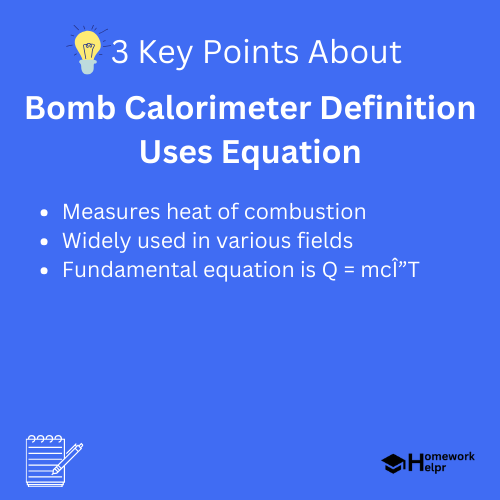📝 Summary
Bomb calorimeter is a crucial device in chemistry and physics for measuring the heat of combustion of substances. It consists of a strong metal bomb that contains the sample and is surrounded by water for accurate temperature measurement. Widely used in fuel testing, food science, and environmental studies, it helps determine energy content and emissions. The fundamental equation, Q = mcΔT, is vital for calculating the energy released during combustion. Despite its usefulness, bomb calorimeters have limitations such as pressure changes and the potential for incomplete combustion.
Understanding Bomb Calorimeter
A bomb calorimeter is an important device in the field of chemistry and physics, primarily used for measuring the heat of combustion of a substance. This instrument helps scientists and engineers understand how much energy is released during chemical reactions. In this article, we will delve into the definition, uses, and key equations related to bomb calorimeters.
Definition of Bomb Calorimeter
A bomb calorimeter consists of a strong metal container known as a bomb, which holds the substance being studied. The bomb is placed in a known quantity of water, and the entire setup is insulated to minimize heat exchange with the surroundings. This design allows for precise measurement of temperature changes during the combustion process.
Definition
Calorimeter: A device used to measure the amount of heat involved in a chemical reaction.
How Does a Bomb Calorimeter Work?
The bomb calorimeter works by igniting a sample in a controlled environment. When the sample combusts, it releases heat, which raises the temperature of the surrounding water. By measuring the temperature change in the water, we can calculate the amount of energy released by the substance.
The key components of a bomb calorimeter include:
- Bomb chamber: Contains the sample and combustion agent.
- Insulation: Prevents heat loss during the experiment.
- Water bath: Surrounds the bomb to absorb heat.
- Thermometer: Measures the temperature change of the water.
Examples
If you burn 1 gram of ethanol in a bomb calorimeter and measure a temperature rise of 5 °C in the water, you can use this data to determine the energy released during the combustion.
Uses of Bomb Calorimeter
Bomb calorimeters are widely used in different fields for various purposes. Their accurate measurements make them invaluable in research and industry. Here are some common uses:
- Fuel testing: To determine the energy content of different fuels, which is crucial for energy industries.
- Food science: To calculate the caloric content of food items, helping nutritionists design balanced diets.
- Environmental studies: To assess the energy emissions of combustible materials, important for environmental protection.
❓Did You Know?
Did you know that the calorific value of a food item tells us how much energy we can gain from consuming it? For example, 1 gram of carbohydrates provides about 4 calories!
Calculating Energy Using the Bomb Calorimeter
The fundamental equation that governs the calculation of energy using a bomb calorimeter involves the change in temperature of the water and the heat capacity of the water. The equation can be expressed as follows:
Q = mcΔT
Where:
- Q = Heat absorbed or released (in Joules)
- m = Mass of the water (in grams)
- c = Specific heat capacity of water (approximately 4.18 J/g°C)
- ΔT = Change in temperature (in °C)
Examples
If you have 200 grams of water with a temperature increase of 10 °C, the heat absorbed would be calculated as: Q = 200g × 4.18 J/g°C × 10 °C = 8360 Joules.
Limitations of Bomb Calorimeter
While bomb calorimeters are highly effective for calorimetry studies, they have some limitations that researchers should keep in mind:
- Pressure changes: The combustion process may lead to pressure changes that can affect measurements.
- Incomplete combustion: If the sample doesn’t burn completely, it can lead to inaccurate readings.
- Calibration: Calibrating the device requires precision, affecting the overall accuracy of the experiment.
Definition
Calibration: The process of adjusting the precision of a measurement device to ensure accurate results.
Conclusion
In conclusion, the bomb calorimeter is a vital instrument used in various scientific fields for measuring the energy produced by combustion reactions. Understanding its workings, applications, and calculations can help students and researchers grasp the importance of energy measurements in both practical and theoretical contexts. With proper use and understanding, bomb calorimeters can lead to significant advancements in science, technology, and environmental studies.

Related Questions on Bomb Calorimeter Definition Uses Equation
What is a bomb calorimeter?
Answer: A device to measure heat of combustion.
What are its main uses?
Answer: Fuel testing, food science, and environmental studies.
What is the key equation used?
Answer: Q = mcΔT to calculate energy.
What are the limitations of bomb calorimeters?
Answer: Pressure changes and incomplete combustion affect accuracy.
